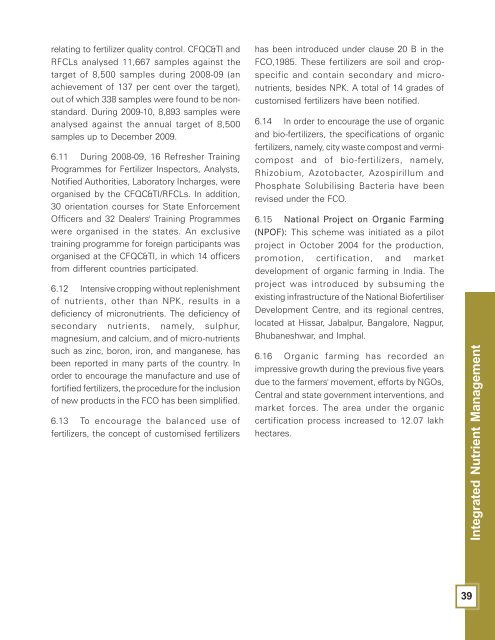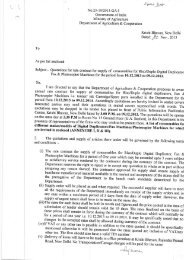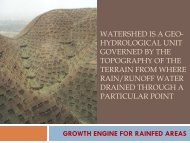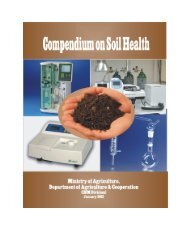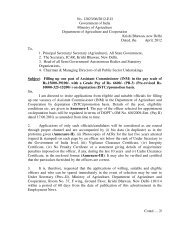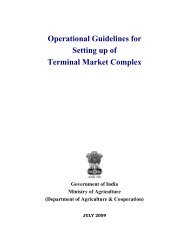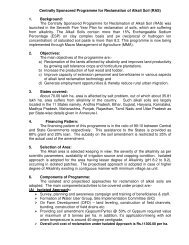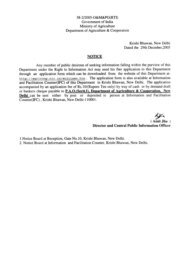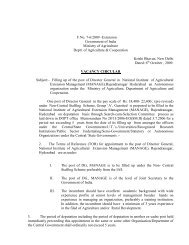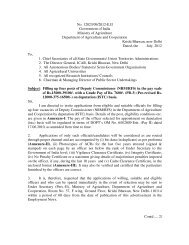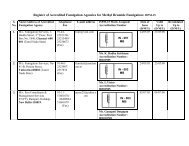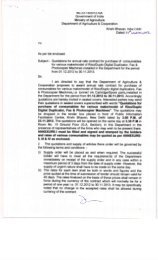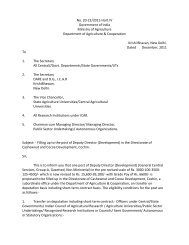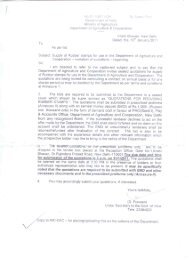Annual Report 2009-2010 - Department of Agriculture & Co-operation
Annual Report 2009-2010 - Department of Agriculture & Co-operation
Annual Report 2009-2010 - Department of Agriculture & Co-operation
You also want an ePaper? Increase the reach of your titles
YUMPU automatically turns print PDFs into web optimized ePapers that Google loves.
elating to fertilizer quality control. CFQC&TI and<br />
RFCLs analysed 11,667 samples against the<br />
target <strong>of</strong> 8,500 samples during 2008-09 (an<br />
achievement <strong>of</strong> 137 per cent over the target),<br />
out <strong>of</strong> which 338 samples were found to be nonstandard.<br />
During <strong>2009</strong>-10, 8,893 samples were<br />
analysed against the annual target <strong>of</strong> 8,500<br />
samples up to December <strong>2009</strong>.<br />
6.11 During 2008-09, 16 Refresher Training<br />
Programmes for Fertilizer Inspectors, Analysts,<br />
Notified Authorities, Laboratory Incharges, were<br />
organised by the CFQC&TI/RFCLs. In addition,<br />
30 orientation courses for State Enforcement<br />
Officers and 32 Dealers' Training Programmes<br />
were organised in the states. An exclusive<br />
training programme for foreign participants was<br />
organised at the CFQC&TI, in which 14 <strong>of</strong>ficers<br />
from different countries participated.<br />
6.12 Intensive cropping without replenishment<br />
<strong>of</strong> nutrients, other than NPK, results in a<br />
deficiency <strong>of</strong> micronutrients. The deficiency <strong>of</strong><br />
secondary nutrients, namely, sulphur,<br />
magnesium, and calcium, and <strong>of</strong> micro-nutrients<br />
such as zinc, boron, iron, and manganese, has<br />
been reported in many parts <strong>of</strong> the country. In<br />
order to encourage the manufacture and use <strong>of</strong><br />
fortified fertilizers, the procedure for the inclusion<br />
<strong>of</strong> new products in the FCO has been simplified.<br />
6.13 To encourage the balanced use <strong>of</strong><br />
fertilizers, the concept <strong>of</strong> customised fertilizers<br />
has been introduced under clause 20 B in the<br />
FCO,1985. These fertilizers are soil and cropspecific<br />
and contain secondary and micronutrients,<br />
besides NPK. A total <strong>of</strong> 14 grades <strong>of</strong><br />
customised fertilizers have been notified.<br />
6.14 In order to encourage the use <strong>of</strong> organic<br />
and bio-fertilizers, the specifications <strong>of</strong> organic<br />
fertilizers, namely, city waste compost and vermicompost<br />
and <strong>of</strong> bio-fertilizers, namely,<br />
Rhizobium, Azotobacter, Azospirillum and<br />
Phosphate Solubilising Bacteria have been<br />
revised under the FCO.<br />
6.15 National Project on Organic Farming<br />
(NPOF): This scheme was initiated as a pilot<br />
project in October 2004 for the production,<br />
promotion, certification, and market<br />
development <strong>of</strong> organic farming in India. The<br />
project was introduced by subsuming the<br />
existing infrastructure <strong>of</strong> the National Bi<strong>of</strong>ertiliser<br />
Development Centre, and its regional centres,<br />
located at Hissar, Jabalpur, Bangalore, Nagpur,<br />
Bhubaneshwar, and Imphal.<br />
6.16 Organic farming has recorded an<br />
impressive growth during the previous five years<br />
due to the farmers' movement, efforts by NGOs,<br />
Central and state government interventions, and<br />
market forces. The area under the organic<br />
certification process increased to 12.07 lakh<br />
hectares.<br />
Integrated Nutrient Management<br />
39


